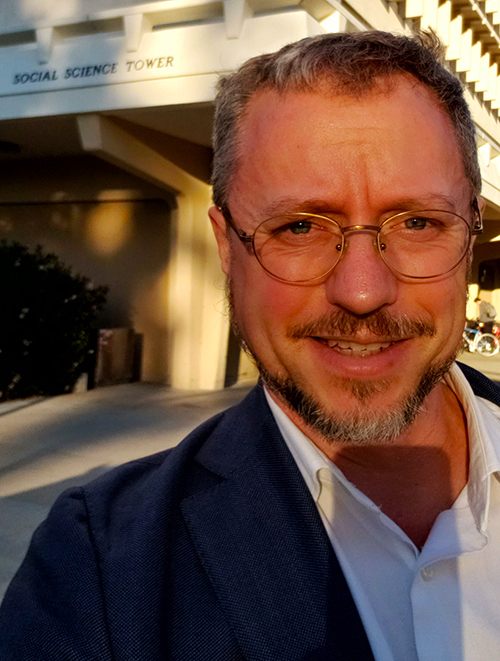Kugelman Fellowships, created by Dulcie and Larry Kugelman, help UCI graduate students advance citizen peacebuilding worldwide. Photo: Daniel Cewinski
For 12 years, Bruce Hemmer, Ph.D. ’09, has worked behind the scenes to prevent conflict and maintain stability in numerous countries around the world.
As a senior conflict prevention officer in the State Department’s Bureau of Conflict and Stabilization Operations, Hemmer relies on skills he honed as a UCI graduate student in political science, researching conflict in Bosnia and Northern Ireland, with the support of two Kugelman Fellowships from UCI’s Center for Citizen Peacebuilding.
“My graduate research included field work in two countries, organizing over 80 interviews with local peacebuilding organizations and experts, conducting surveys, measuring various contextual variables, and finding ways to analyze it all,” says Hemmer.
Hemmer is among the more than 125 UCI graduate students who have won Kugelman Fellowships since the program began in 2006, thanks to funding from Dulcie and Larry Kugelman. Their fellowships have enabled students to study conflict and peacebuilding efforts all around the globe.
“The experience of going out into the field and collecting your own data and analyzing it is different than using existing data,” says Hemmer, whose dissertation compared how the political engagement peacebuilding organizations in Northern Ireland and Bosnia were affected by their varying levels of experience with democracy.

Hemmer is one of the lead experts guiding how U.S. agencies including the USAID and Department of Defense are implementing the Global Fragility Act, which requires 10-year conflict prevention plans in selected countries, developed in close partnership with local government, civil society, and the private sector. Congress has already provided $100 million in support, and more is expected in subsequent years.
The Kugelman Fellowships
Through their relationship with the local nonprofit Share Our Selves, the Kugelmans were introduced to UCI’s Center for Citizen Peacebuilding in 2001, and immediately became integral to the center.
“The Kugelman Fellowship program is one of the most significant, ongoing accomplishments of the Center for Citizen Peacebuilding,” says David Snow, Distinguished Professor emeritus of sociology and director of the Center for Citizen Peacebuilding. “Consistent with the center’s mission, it provides funding for UCI graduate students, principally in the social sciences, to pursue research on conflict and conflict resolution and peace initiatives worldwide.”
“The Kugelman Fellowship program is one of the most significant, ongoing accomplishments of the Center for Citizen Peacebuilding.”
- David Snow, Distinguished Professor emeritus of sociology and director of the Center for Citizen Peacebuilding
The 12 Kugelman Fellows funded in 2021-22 span a wide range of interests: one is conducting field research in Northern Ireland on the legislative election, another is exploring post-genocide peacebuilding in Rwanda, and a third is examining the international complexity of providing protection for Rohingya refugees.
“According to these and many other Kugelman Fellows with whom I’ve spoken, their research projects, which typically result in a dissertation, would not have been possible without the Kugelmans’ support,” says Snow.
The fellowships can be used for travel, equipment, field interviews, living expenses, and in some cases, serve as seed money for trying to get an even larger grant.
“We came into contact with grad students and realized most needed to raise money to do their research, yet they had fewer avenues for raising money than professors,” says Larry. “We started to see what they could do with a small amount of money, and it was incredible.”
As the fellows graduate and go on to their own careers, the Kugelmans have enjoyed staying in touch.
“We realize we are making an investment in people,” says Dulcie. “We’re interested in encouraging students to take a look at peace, how all of these parts fit together for a more peaceful world, and to do more research in areas related to peace.”
“We’re very proud of the students,” says Larry. “We feel a personal bond and attachment to them, and it gives us a lot of pleasure to see them doing well, seeing them changed by their experiences.”